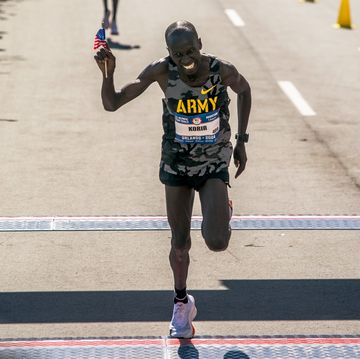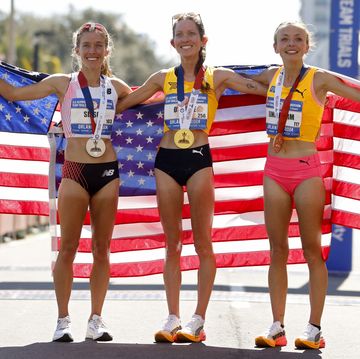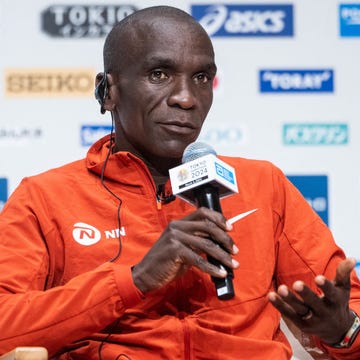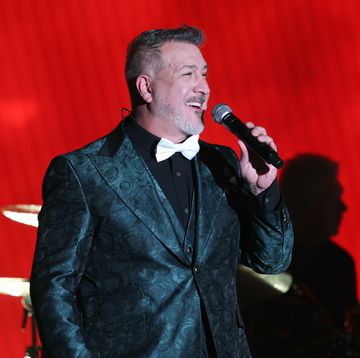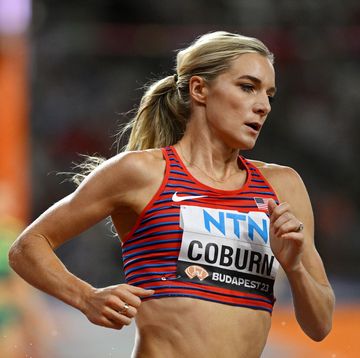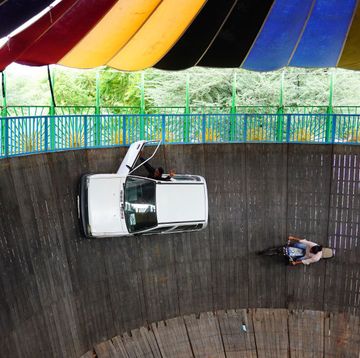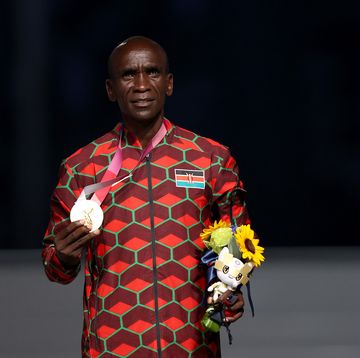For most of her career, Kellyn Taylor has been balancing 100-mile weeks with firefighter training. Long runs with ax drills. Speed workouts with body drags. Hills with fire hose pulls.
There’s no quit in her.
But on occasion, Taylor, 30, sees typical age-appropriate frustration coursing through her seven-year-old daughter when trying something new. As a mom she hopes that the right example has already been set.
“She’s in this weird stage where if she’s not good at something, she’s done with it,” Taylor says of Kylyn. “This morning she said she’s not good at basketball. I told her if you tell yourself you’re not good at it, you won’t be. If you keep working, you’ll get better.”
It’s not that those emotions are foreign, however. Taylor has found herself in situations where the thought of giving up has taken hold. In the 2016 Olympic Trials marathon, where she placed sixth after throwing in an early surge that defined the race, she considered stopping with six miles to go. In the subsequent 10,000 meters in Eugene, Oregon, where she finished fourth—one spot away from making the Olympic team—the heat was brutal enough to let the same doubt creep in.
“I hope Kylyn sees that maybe I don’t hit my goals all the time, but that if you keep working toward something that it’ll pay off in some form or another,” Taylor says. “Maybe a great time, a fantastic finish, or making a team. I want her to learn not to quit.”
It’s been like this as long as she can remember. After graduating from Wichita State University, Taylor dreamed of moving to Flagstaff, Arizona, to take a crack at running professionally with the McMillan Elite team. Just a month after being accepted to the post-collegiate training group, she was pregnant—but never considered that her running career might be over before it began. Her spot on the team was merely put on hold until she and her husband, Kyle, could manage the transition.
“When my husband came back from [deployment in] Afghanistan, we moved out here when Kylyn was nine months old,” Taylor says. “It certainly wasn’t easy but it was something I chose to do and we found a way to do it. It’s like running with a stroller—it’s not ideal, but you find a way.”
Since then, Taylor’s career has been a gradual build. She took her first crack at the marathon in 2015 and ran 2:28:40 in Houston that year, putting her on a short list of American women faster than 2:30. She qualified for the U.S. Olympic Trials in three events (marathon, 10,000 and 5,000 meters) and contested all three. The closest she came to the Rio Games was the alternate position in the 10,000 meters, which left her unsatisfied.
Controversy Over Bostons 6-Hour Results Cutoff.
“Because I was the alternate I had to go through [Olympic team] processing and everything. That was terrible,” Taylor says. “They make you do [Team USA] uniform fittings, fill out all the forms. The only thing you don’t do is book your travel. Then you sit in drug testing with the three people who made the team. And I’m like, ‘Good job. Yay.’”
Her Northern Arizona Elite teammates repeatedly use one word to describe Taylor: tough. She can power through workouts at 7,000 feet of altitude few others can complete, while managing triple-digit running mileage per week. Even on a day that doesn’t live up to her high expectations—like the 2017 London Marathon, where she finished 13th in 2:28:51—Taylor still turns in solid performances.
And she does all this while studying to be a firefighter, taking classes that are physically demanding and academically time-consuming. Taylor now has her firefighter certification, after years of studies as one of the only women in her class, and wants to pursue a firefighting job while continuing her running career through the 2020 Olympics.
“There wasn’t anything I couldn’t do in our classes. You’re hitting roofs with an ax or pulling up hoses or doing body drags—it’s extremely taxing,” she says. “The challenge of it is something that ultimately drew me to it. It’s a male-dominated profession, and it’s a challenge for a woman to do it and excel in it.”
Holding down both jobs may seem like lunacy to most people, but Stephanie Bruce, who has been a teammate of Taylor’s since 2011, says Taylor has no idea “how to do nothing.” At sea-level training camps, while the rest of the group relaxes and watches movies between runs, Taylor just gets antsy. After all, when she’s at home, not only is she training, studying, and parenting, but she’s also taking care of five dogs and seven chickens on the family’s five acres of land.“She does not like to chill,” Bruce says. “But the woman never gets hurt. She’s been healthy for six years straight and that’s a huge part of her success. The thing is, she’s not limited by her bones or tendons—what ultimately breaks her down is fatigue. She’ll just keep suffering. She’ll out-suffer anybody.”
And while that grit may be what leads to Taylor’s greatness, it’s also what led her to withdraw from the New York City Marathon in 2016. As she was ramping up the training cycle, her body just wasn’t responding to the training. The same thing happened after the London Marathon. As many of her peers prepare to compete at the national track and field championships beginning on Thursday in Sacramento, California, Taylor decided to forego her track season when the early workouts weren’t going well.
Then a spot on the U.S. world championships marathon team was offered to her, scheduled for August in London. The chance to be on a national team was tempting, but one she had to pass up as she recovers from London.
“My body just wasn’t coming around,” she says. “Going into it not feeling great just wasn’t a good situation. I had to make the tough decision, but the right decision.”
Now Taylor hopes to target a fall marathon. But between now and then she’ll enjoy the summer with her family, relishing the rare opportunity to visit her parents back home in Wisconsin and finish off her EMT course in Phoenix. And, of course, there’s Kylyn’s full schedule to keep up with, which includes soccer, martial arts, and softball.
“There are moments when she wants to run. We’ll stop at our mailbox, which is .65 miles to our house and she’ll ask me to drop her off and say, ‘I’ll run home!’” Taylor says. “I drive right behind her. Sometimes she’ll get a side ache and we’ll have to talk about that a little bit.
I tell her, ‘It doesn’t always feel good. Sometimes it hurts really bad, but you just have to keep running.’”






